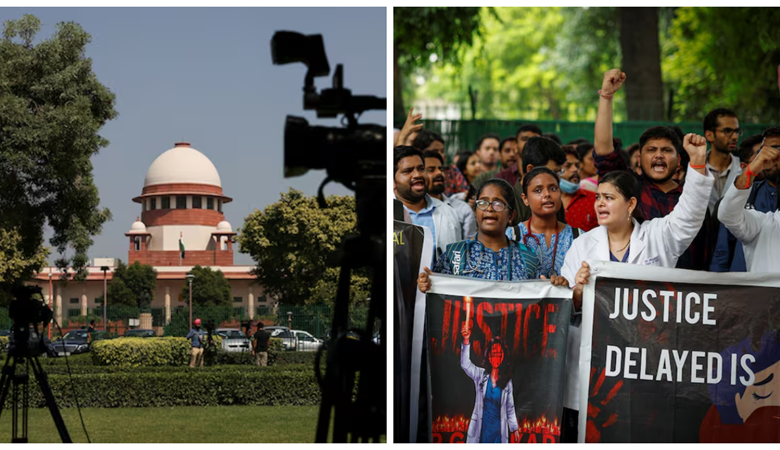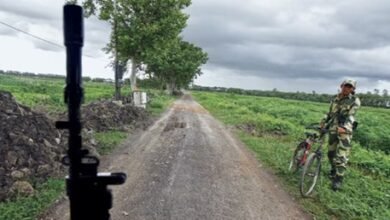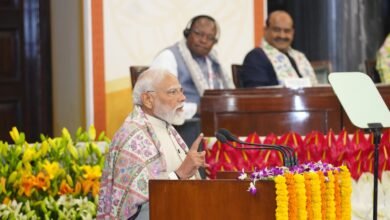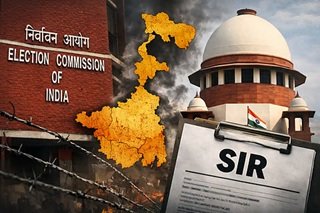Key Highlights Of Minute to Minute SC Hearing On Kolkata RG Kar Doctor’s Murder: Dealing With Systemic Safety Issues in Medical Field

News Mania Desk/Agnibeena Ghosh/21th August 2024
The Supreme Court of India has initiated a suo motu case concerning the tragic rape and murder of a 31-year-old resident doctor at the State-run RG Kar Medical College and Hospital in Kolkata, West Bengal. This case, which has raised serious concerns about the safety of medical professionals across the nation, is being heard by a Bench comprising Chief Justice of India (CJI) DY Chandrachud, along with Justices JB Pardiwala and Manoj Misra.
During the hearing, CJI Chandrachud explained the court’s decision to take up the matter suo motu, despite it being under the purview of the High Court. He emphasized that this case transcends the horrific crime in Kolkata and touches on a broader, systemic issue—the alarming lack of safety for doctors, particularly women, in hospitals across India. The CJI expressed deep concern over the absence of adequate safety measures for doctors, who often work under perilous conditions, highlighting the urgent need for a national consensus to establish a standard protocol ensuring their safety.
The CJI also criticized the dissemination of the victim’s photos and videos in the media, pointing out that such actions violate court judgments prohibiting the publication of sexual assault survivors’ identities. Furthermore, the CJI noted troubling discrepancies in the handling of the case, including the initial misrepresentation of the crime as a suicide by the hospital’s principal and the delayed filing of a First Information Report (FIR), which was not registered until late at night, hours after the victim’s body had been handed over to her parents for cremation.
Senior Advocate Kapil Sibal, representing the state, argued that an FIR for unnatural death had been registered promptly and that an inquest had been conducted, revealing the murder. However, the CJI questioned the adequacy of the response, particularly the failure to promptly identify the crime as a murder.
The Supreme Court also addressed the violent protests that erupted following the crime, during which a large mob vandalized critical hospital facilities. The CJI expressed dismay at the police’s failure to protect the crime scene and criticized the state for not deploying adequate measures to maintain law and order.
In response to these concerns, the CJI announced the formation of a national task force(NTF) comprising doctors from diverse backgrounds. This task force will be responsible for suggesting modalities to ensure the safety of medical professionals across India. The CJI urged doctors to resume work, assuring them that the court is committed to safeguarding their safety and security.
The Supreme Court’s directives to the NTF include several critical measures aimed at bolstering security and improving the overall working conditions in medical institutions. These measures include increasing security in emergency rooms, implementing baggage screening to prevent weapons from entering hospitals, and restricting access to non-patients. Additionally, the task force is instructed to consider the installation of biometric and facial recognition systems, improved lighting, and comprehensive CCTV coverage across all hospital areas.
To further support medical professionals, the NTF is also tasked with recommending the establishment of restrooms for doctors and gender-neutral spaces for all medical staff. The court underscored the importance of providing secure transportation for medical professionals working night shifts, specifically from 10 PM to 6 AM. Moreover, the court suggested that workshops be conducted to train medical staff in handling grief and crisis situations, and mandated quarterly audits of institutional safety measures.
The CJI emphasized that the term “medical professionals” in this context covers all individuals in the medical field, including doctors, interns, resident and senior resident doctors, as well as nurses, including nursing interns. The NTF is expected to submit an interim report within three weeks and a final report within two months, detailing the progress on these safety measures and proposing timelines for their implementation based on existing hospital infrastructure.
The court also directed all states and Union Territories, through their health departments, as well as the Union government, to collect and submit detailed information regarding the security arrangements at hospitals. This includes the number of security personnel employed, the presence of baggage screening, the availability of resting rooms and their facilities, and the extent of CCTV coverage in hospitals. The data, which is to be tabulated and submitted by the central government within a month, will also include information on the training provided to handle patient grief, the existence of police outposts, and the implementation of the Internal Complaints Committee (ICC) as mandated by the Prevention of Sexual Harassment (POSH) Act.
Additionally, the Central Bureau of Investigation (CBI) has been ordered to submit a status report on the progress of the criminal investigation by August 22, 2024. The state of West Bengal is also required to provide a report by the same date on the investigation into acts of vandalism that occurred at RG Kar Medical College and Hospital following the incident.






